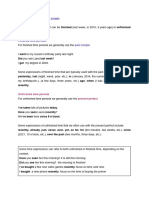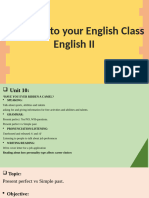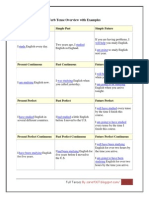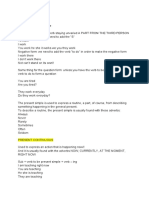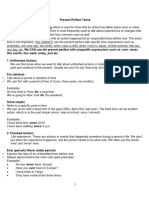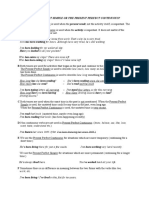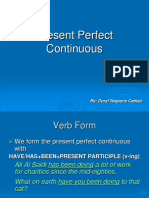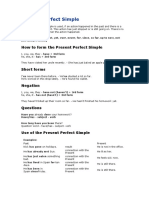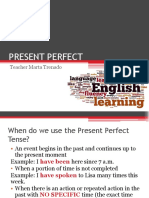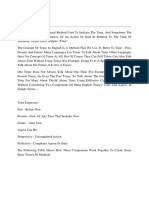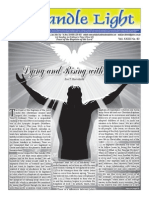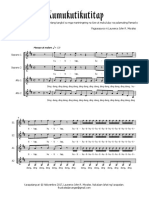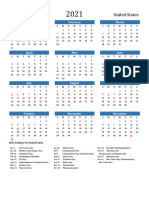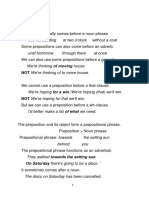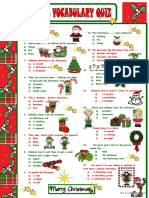Paola, Hector, Tomas
Paola, Hector, Tomas
Uploaded by
Escuela De Ingles LetCopyright:
Available Formats
Paola, Hector, Tomas
Paola, Hector, Tomas
Uploaded by
Escuela De Ingles LetCopyright
Available Formats
Share this document
Did you find this document useful?
Is this content inappropriate?
Copyright:
Available Formats
Paola, Hector, Tomas
Paola, Hector, Tomas
Uploaded by
Escuela De Ingles LetCopyright:
Available Formats
Present Perfect Tense - For and Since
We use Present Perfect tense to talk about action which started in the past and continues up to the present. Examples I have had this computer for about a year. How long have you been at this school? I haven't seen Julia since September. Tip! For other uses of the Present Perfect tense, see the Present Perfect Tense - When To Use. We use for with a period of time, for example: a few days, half an hour, two years. We use since with the time when the action started, for example: last year, June 8, I met you. Exercise. Do we use for or since with the following time references?
Principio del formulario
since
since
I haven't phoned home
since
Christmas.
We've been here
nine o'clock.
for
I have worked for International House
since
more than eight years.
I haven't visited my home town
for
I left school.
I haven't been to the cinema
since
ages.
I have studied non-stop
since
9.15.
I have had a driving licence
since
I was eighteen.
She hasn't had a day off
for
1999.
Johan has been in England
since
more than two weeks now.
Peter has been my best friend
for
we were nine.
since
last weekend
for since
ten seconds
for
Christmas a couple of
for
Eve
since
a decade
for
I finished school a long time
since since
days
since
my birthday the 70s
ten
for
centuries
I was a boy
August
for
since
since
the last month
since
fifteen years
since
the accident
for
then millennium
we bought this house
since
last month
I met you
Se usa la frmula PRESENTE PERFECTO SIMPLE + JUST /yst/ (justo, exactamente) para indicar una accin que se ha realizado hace unos momentos. Se lo utiliza tanto en afirmativo como en interrogativo y se lo traduce como acabar de hacer algo. Ejemplos: I have just had dinner (Acabo de cenar) Have you just arrived? (Acabas de llegar?) YET /it/ se usa en frases negativas con el sentido de todava o any va ubicado siempre al final de la oracin. Ejemplo: Helen hasn't come yet (Helen no ha venido an). . Cuando se lo utiliza en oraciones interrogativas significa ya y tambin va al final de la pregunta. Ejemplo: Have you finished it yet? (Lo terminaste ya?) ALREADY /olrdi/ se usa en frases afirmativas e interrogativas y normalmente va detrs de los verbos auxiliares o modales y delante de los dems verbos. Inclusive se utiliza con el Pasado Simple. Ejemplos: Have you finished already? (Ya terminaste?); I already knew Martha (Yo ya la conoca a Marta). Cuando already expresa sorpresa de que una accin se haya realizado antes de lo esperado se puede colocar al final de la frase:He has found a job already! (Ya ha encontrado trabajo!); Is the taxi there already? (Ya est ah el taxi?).
1. Have you seen John anywhere? Yes, I have just seen him. 2. Has Ann called yet? Yes, she has just called. 3. Would you like an ice-cream? No, thanks. I have just eaten one. 1. Don`t forget to call eric 1. I have already called him. 2. I have already read it. 3. No, I have already rented it.Final del formulario
You might also like
- Completed and Uncompleted Past Actions Closely Related To The Present PDFDocument24 pagesCompleted and Uncompleted Past Actions Closely Related To The Present PDFLORAINE CAUSADO BARONNo ratings yet
- LTL Exercise 02202018Document8 pagesLTL Exercise 02202018Kate MontenegroNo ratings yet
- Present Perfect & Present Perfect Continuous Tenses: Dr. Pauline GhengheshDocument13 pagesPresent Perfect & Present Perfect Continuous Tenses: Dr. Pauline Ghengheshzak100% (1)
- Present Perfect and ContinuousDocument45 pagesPresent Perfect and Continuouscorrnelia1No ratings yet
- Present Perfect and ContinuousDocument46 pagesPresent Perfect and Continuouspmalencar100% (3)
- Present Perfect - Past PerfectDocument16 pagesPresent Perfect - Past PerfectBárbara Rodríguez GonzálezNo ratings yet
- Lesson N°2 Present Perfect Simple and Continuous-Grammar RulesDocument7 pagesLesson N°2 Present Perfect Simple and Continuous-Grammar RulesKamil Henriquez100% (1)
- Present Perfect GrammarDocument3 pagesPresent Perfect GrammarCoti MaciasNo ratings yet
- Presentación10 English 2Document27 pagesPresentación10 English 2befogob166No ratings yet
- Present Perfect 101: Form The Present Perfect Simple Is Made With - Has/have + Past ParticipleDocument3 pagesPresent Perfect 101: Form The Present Perfect Simple Is Made With - Has/have + Past ParticipleAdam CahillNo ratings yet
- Verb Tense Review: The Importance of TimeDocument32 pagesVerb Tense Review: The Importance of Timebaba ioana100% (1)
- Present Perfect Continuous TenseDocument5 pagesPresent Perfect Continuous TenseDost JanNo ratings yet
- Present Perfect Simple ContinuousDocument17 pagesPresent Perfect Simple ContinuousLiliana RaduNo ratings yet
- English Tenses: Present Perfect TenseDocument3 pagesEnglish Tenses: Present Perfect TenseKatarina Perčobić100% (1)
- Present PerfectDocument59 pagesPresent PerfectAlejandro PrezaNo ratings yet
- Present PerfectDocument18 pagesPresent PerfectPopescu DanielaNo ratings yet
- FULL GUIDE - Present Perfect Passive (2020)Document11 pagesFULL GUIDE - Present Perfect Passive (2020)Mary JerilNo ratings yet
- Present Perfect TenseDocument11 pagesPresent Perfect TenseZahid Hussain BrohiNo ratings yet
- Full Tenses PDFDocument40 pagesFull Tenses PDFsarief100% (2)
- The 12 Verb Tenses in EnglishDocument5 pagesThe 12 Verb Tenses in EnglishAhmed AdelNo ratings yet
- IngleseDocument9 pagesIngleseFrancesca Di GiamberardinoNo ratings yet
- Chapter 6 Present Perfect TenseDocument3 pagesChapter 6 Present Perfect Tenseapucila4No ratings yet
- The Present Perfect Simple or The Present Perfect ContinuousDocument2 pagesThe Present Perfect Simple or The Present Perfect ContinuousGülten KüçükNo ratings yet
- Present Perfect ContinuousDocument27 pagesPresent Perfect Continuousapi-252190418No ratings yet
- FULL GUIDE - Present Perfect Passive (2020)Document11 pagesFULL GUIDE - Present Perfect Passive (2020)Melany OrdonezNo ratings yet
- Present Perfect TenseDocument9 pagesPresent Perfect TenseDost Jan100% (1)
- TensesDocument27 pagesTensesMaría MercedesNo ratings yet
- Assignment 06: Course: Basic English (ENG-101)Document6 pagesAssignment 06: Course: Basic English (ENG-101)Shamsul Islam RaisyNo ratings yet
- Present Perfect VDocument31 pagesPresent Perfect VelzharahmaelzaNo ratings yet
- Use of Tenses: Hafiz Muhammad Naveed AhsanDocument86 pagesUse of Tenses: Hafiz Muhammad Naveed Ahsankanwal hafeezNo ratings yet
- VerbsDocument48 pagesVerbsRyla TangahuNo ratings yet
- Inglês 10ºanoDocument5 pagesInglês 10ºanoDANIELA TEIXEIRANo ratings yet
- Present Perfect - For - SinceDocument10 pagesPresent Perfect - For - SinceCarlos SuarezNo ratings yet
- Present Perfect & ProgressiveDocument16 pagesPresent Perfect & ProgressiveRizqi AmaliyahNo ratings yet
- Engleski Gramatika Sva VremenaDocument13 pagesEngleski Gramatika Sva VremenaMirjana BrčićNo ratings yet
- English TensesDocument19 pagesEnglish TensesPS DigitalEraNo ratings yet
- Unidad 2Document5 pagesUnidad 2yasminNo ratings yet
- Present Perfect Simple & ContinuousDocument20 pagesPresent Perfect Simple & Continuousbuendia8986% (7)
- Presentperfect 2ºESODocument21 pagesPresentperfect 2ºESOcamilo sanchezNo ratings yet
- Tenses - 10thDocument11 pagesTenses - 10thsantichandola2018No ratings yet
- How To Form The Present Perfect SimpleDocument15 pagesHow To Form The Present Perfect SimpleJohn Romero CevallosNo ratings yet
- Present Perfect GrammarDocument4 pagesPresent Perfect GrammarHecuba2009No ratings yet
- Tenses: PresentDocument11 pagesTenses: PresentGhulam MurtazaNo ratings yet
- The 12 Verb Tenses in EnglishDocument5 pagesThe 12 Verb Tenses in EnglishAhmed AdelNo ratings yet
- Diapo 2 Ciclo 10 PDFDocument39 pagesDiapo 2 Ciclo 10 PDFDaniyar Quintanilla QuintanillaNo ratings yet
- TensesDocument78 pagesTensesJe Buli-buliNo ratings yet
- Rita Grammar. Present Perfect and ContinousDocument15 pagesRita Grammar. Present Perfect and ContinousnersRita100% (1)
- Present Perfect Tense: Definition, Rules and Useful ExamplesDocument4 pagesPresent Perfect Tense: Definition, Rules and Useful ExamplesAbdul RaufNo ratings yet
- Inglés 4 (GNR) - 6HRS - 1Document50 pagesInglés 4 (GNR) - 6HRS - 1Cesar RamosNo ratings yet
- Present PerfectDocument23 pagesPresent PerfectBaharudin BahrinNo ratings yet
- Present Perfect TenseDocument4 pagesPresent Perfect TenseRuthica MANo ratings yet
- IS: He, She, It: Things, Places, Animals Are: You, We, They Am: IDocument7 pagesIS: He, She, It: Things, Places, Animals Are: You, We, They Am: INicoleta GordonNo ratings yet
- English GrammerDocument14 pagesEnglish GrammerDino DinoNo ratings yet
- Present Perfect Tense - ExplanationDocument14 pagesPresent Perfect Tense - ExplanationMåyi Muñoz ArayąNo ratings yet
- Present Perfect vs. Past Simple TenseDocument49 pagesPresent Perfect vs. Past Simple TenseZhantel OcampoNo ratings yet
- Pre Chapter Tenses - 2021-2Document44 pagesPre Chapter Tenses - 2021-2daniel madrigalNo ratings yet
- Present Perfect: Teacher Marta TrenadoDocument14 pagesPresent Perfect: Teacher Marta TrenadoMarta TrenadoNo ratings yet
- TenseDocument4 pagesTenseZia ur RehmanNo ratings yet
- Pet Grammar PointsDocument69 pagesPet Grammar PointsTatiana ZaraNo ratings yet
- Badge: Seuss ArtDocument2 pagesBadge: Seuss ArtLaura Rajsic-LanierNo ratings yet
- Sentences Using The Words in Bold. Use Two To Five WordsDocument1 pageSentences Using The Words in Bold. Use Two To Five WordsNicholas CollinsNo ratings yet
- Christmas CrosswordDocument2 pagesChristmas CrosswordAnikó KovácsNo ratings yet
- Santa Claus Is Comin To Town SATBDocument2 pagesSanta Claus Is Comin To Town SATBGonzalo DiazNo ratings yet
- Jan. 11-16, 2015Document6 pagesJan. 11-16, 2015jaroCLNo ratings yet
- 9th Issue November 7Document12 pages9th Issue November 7The TartanNo ratings yet
- SS OK Activity 2 Prepositions of Time - In-On-AtDocument2 pagesSS OK Activity 2 Prepositions of Time - In-On-AtMilton Cesar Rodrigo TantaleanNo ratings yet
- 2020 Calendar eDocument1 page2020 Calendar eHariNo ratings yet
- AV L1-ListeningActivities PDFDocument96 pagesAV L1-ListeningActivities PDFGlorimar Thompson RosarioNo ratings yet
- Ingles Extraordinaria 1o Bac 19Document2 pagesIngles Extraordinaria 1o Bac 19David GarmendiaNo ratings yet
- Merry Christmas - Ed Sheeran + Elton John LyricsDocument2 pagesMerry Christmas - Ed Sheeran + Elton John LyricsSimon GriggsNo ratings yet
- Creative Writing Story StartersDocument2 pagesCreative Writing Story StartersNormala HashimNo ratings yet
- Intervals & Harmony Guide PDF2121Document16 pagesIntervals & Harmony Guide PDF2121Ritik SinghalNo ratings yet
- The Little Drummer Boy: (Ra Ta Tam Tam)Document4 pagesThe Little Drummer Boy: (Ra Ta Tam Tam)Manuel GioloNo ratings yet
- BINATBATANDocument2 pagesBINATBATANAngelica Faye LitonjuaNo ratings yet
- Kumukutikutitap (Cayabyab, Reyes, Arr. Morales)Document8 pagesKumukutikutitap (Cayabyab, Reyes, Arr. Morales)frustratedarrangerNo ratings yet
- United States: January February MarchDocument1 pageUnited States: January February MarchSiriNo ratings yet
- bài tập thìDocument4 pagesbài tập thìLan PhanNo ratings yet
- You Are Loved PDFDocument4 pagesYou Are Loved PDFAbrielle Angeli DeticioNo ratings yet
- Christmas Is A LieDocument70 pagesChristmas Is A LieDarren Alex Bright100% (2)
- Prepositions in EnglishDocument12 pagesPrepositions in EnglishOmar H. AlmahdawiNo ratings yet
- Mixed TensesDocument3 pagesMixed Tensesnota3271% (7)
- Christmas Deer Ornament Amigurumi PDF Free PatternDocument8 pagesChristmas Deer Ornament Amigurumi PDF Free Patternsurya pranesNo ratings yet
- Christmas-traditions-in-the-united-states-reading-comprehension-activity_ver_4Document4 pagesChristmas-traditions-in-the-united-states-reading-comprehension-activity_ver_4dungnguyenle2000No ratings yet
- Christmas Quiz PDFDocument2 pagesChristmas Quiz PDFDominikNo ratings yet
- Fairyland Pre Junior TRPDocument104 pagesFairyland Pre Junior TRPdinaNo ratings yet
- 1975Document184 pages1975Dallas County R-I SchoolsNo ratings yet
- Hans ScriptDocument6 pagesHans ScriptJobed EspantoNo ratings yet
- My Country, PolandDocument10 pagesMy Country, PolandlilavatiNo ratings yet







